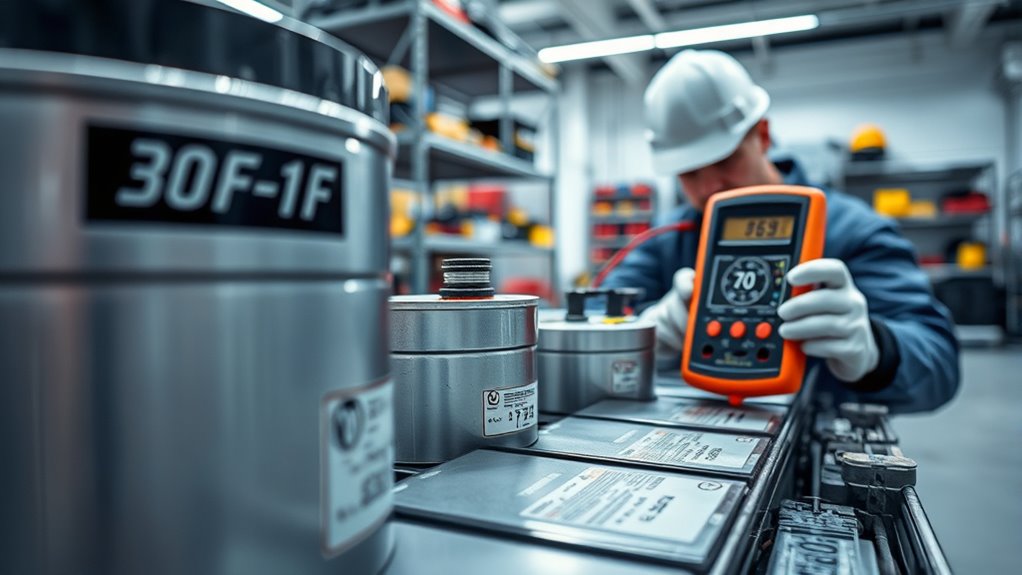When you outsource battery maintenance, you risk voiding your warranty if service agreements aren’t clear or don’t follow manufacturer standards. Poorly trained or uncertified service providers may cause damage or neglect proper care, leading to premature failures. Keeping detailed records and ensuring routine diagnostics are essential to protect your warranty. To avoid these pitfalls, it’s vital to understand the risks involved—keep exploring to learn how to safeguard your investment effectively.
Key Takeaways
- Using unapproved service providers can lead to improper handling, risking warranty voidance due to non-compliance with manufacturer standards.
- Vague or incomplete service agreements may omit critical maintenance procedures, jeopardizing warranty coverage.
- Lack of detailed maintenance records and diagnostics can weaken warranty claims and obscure responsibility for battery issues.
- Poor maintenance practices or unqualified technicians can cause premature battery failure, invalidating warranty protections.
- Failing to monitor battery health regularly and enforce proper documentation increases the risk of warranty disputes and reduced battery lifespan.

Outsourcing battery upkeep might seem like a cost-effective way to manage your fleet’s needs, but it can also introduce unexpected warranty pitfalls. One of the key issues is how external service providers handle your batteries’ care, which directly impacts their battery lifespan. When you rely on third-party vendors, you risk losing control over the maintenance process, potentially leading to premature battery failures or reduced performance. If the service agreements aren’t clear or all-encompassing, you might find yourself paying for repairs or replacements that should be covered under warranty, or worse, voiding your warranty altogether.
Outsourcing battery maintenance risks voiding warranties if service agreements lack clarity or manufacturer compliance.
Service agreements are critical in outlining what’s covered and what isn’t. If these agreements are vague or don’t specify manufacturer-approved procedures, you may unknowingly void your warranty. Many warranties require strict adherence to recommended maintenance schedules and procedures. When an outsourced provider deviates from these guidelines, the warranty may become null and void, leaving you responsible for costly repairs or replacements. It’s essential to scrutinize these agreements carefully, ensuring they align with the manufacturer’s requirements, and to verify that the service provider is trained and certified to perform such maintenance.
Another aspect to consider is how outsourcing impacts your ability to monitor battery health over time. Regular maintenance and diagnostic checks are essential for extending battery lifespan, catching issues early, and maintaining ideal performance. If your service provider isn’t diligent or neglects these steps, your batteries could degrade faster than expected, lowering their longevity and increasing replacement costs. Moreover, some warranties are contingent upon documented maintenance records, so without proper records, your warranty claims might be denied when you need them most. High-quality maintenance practices can significantly influence warranty outcomes and overall battery performance.
Additionally, inconsistent maintenance practices by outsourced providers can lead to uneven battery performance across your fleet. This inconsistency can make it difficult to determine the actual cause of failures and complicate warranty claims. If a battery fails prematurely due to improper maintenance, and you don’t have clear documentation or adherence to manufacturer protocols, your warranty might be voided entirely. This emphasizes the importance of choosing a reputable, certified service provider and establishing clear, detailed service agreements that emphasize manufacturer compliance and thorough record-keeping.
In essence, while outsourcing battery maintenance can save costs and streamline operations, it’s crucial to understand the warranty implications. Carefully reviewing and negotiating service agreements, ensuring adherence to manufacturer standards, and maintaining detailed records can help you avoid warranty pitfalls. Doing so not only protects your investment in your fleet’s batteries but also extends their lifespan, ensuring reliable performance and minimizing unexpected expenses down the line.
Frequently Asked Questions
How Can I Verify a Warranty’s Coverage Details?
To verify your warranty’s coverage details, start by reviewing the warranty document thoroughly. Contact the manufacturer or service provider directly for warranty verification, asking specific questions about what’s included and excluded. Keep records of all communications and documents. You can also check online portals if available. Doing this guarantees you understand your coverage, helps avoid surprises, and confirms that your warranty protects you when needed most.
What Are Common Hidden Costs in Outsourced Maintenance?
Ever wondered if there are hidden costs lurking in outsourced maintenance? You might not see the extra charges upfront, but they can include hidden fees for parts or unexpected service delays that boost your expenses. These costs often catch you off guard, affecting your budget and timeline. Always review the contract carefully to identify potential hidden fees, and stay proactive to avoid surprises that could impact your operations.
How Does Outsourcing Affect Warranty Claims Process?
When you outsource battery maintenance, it can complicate your warranty claims process. You need to make certain your warranty documentation is thorough and up-to-date, as incomplete records can delay or deny claims. Service agreements define responsibilities, so clear terms prevent misunderstandings. Outsourcing might lead to delays in providing required documentation or inspections, making it harder to quickly resolve warranty issues. Always review your agreements carefully to avoid unnecessary complications.
What Are the Risks of Using Unauthorized Service Providers?
When you use unauthorized service providers, you’re risking more than just subpar maintenance. Unauthorized service can void your warranty, leaving you unprotected if issues arise. You might face increased repair costs and delays, as these providers may not follow manufacturer standards. Always choose authorized service to guarantee your warranty remains valid, and your equipment stays protected. Avoid shortcuts that could jeopardize your warranty coverage and overall investment.
How Can I Ensure Warranty Compliance With Outsourcing?
A stitch in time saves nine, so you should proactively manage warranty compliance. To do this, keep thorough warranty documentation and ensure your service agreements clearly specify authorized providers and maintenance procedures. Regularly review these documents, verify that outsourced providers follow the agreed-upon standards, and document all work performed. This way, you safeguard your warranty coverage and prevent costly disputes down the line, ensuring reliable battery performance.
Conclusion
Understanding warranty pitfalls when outsourcing battery maintenance helps you avoid surprises down the line. Just like finding a lost key, catching these issues early keeps your operations running smoothly. When you choose the right provider and clarify warranty terms upfront, you prevent costly mistakes—sometimes when you least expect them. So, stay vigilant and double-check those warranties; after all, the smallest details often make the biggest difference in keeping your batteries—and your business—on the right track.










